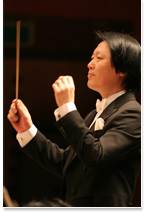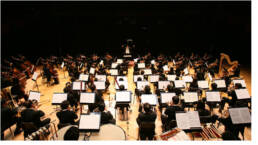
Conductor: Chung Chi-Yong
Chung Chi-Yong is one of most sought-after conductors of his generation in Korea. He studied composition at College of Music, Seoul National University. At that time he conducted contemporary works by Korean composers with Ars Chamber Ensemble. He graduated from conducting class by Michael Gielen in Salzburg Mozarteum, Austria. Chung’s success as a conductor was launched in 1986, when he won the International Conducting Competition of the Austrian Broadcasting Cooperation (ORF) in Vienna. After his appearance as guest conductor of Radio Symphony of Leipzig, Munich Symphony, and Michigan State Symphony, he debuted in Seoul with Korean Symphony Orchestra in 1992. In 1998 He was appointed as chief guest conductor of Seoul Philharmonic Orchestra and from the following year to 2001 he was music director of the orchestra.
Recently his engagements include his debut appearances with Prague Radio Symphony, KBS Symphony, Bucheon Philharmonic, Korean Symphony, Daegu Philharmonic, and Daejon Philharmonic etc.
Chung Chi-Yong holds the posts of music adviser of Contemporary Ensemble of Korean Traditional Music,and music director of Changwon-Philharmonic Orchestra. He is a Chairman of Korean Conductors Association. He is also professor of conducting at Korea National University of Arts.
Chung led Korean premieres of many works by Yun Isang, including Symphony No.1, Engel in Flammen-Memento for Orchestra with Epilogue for Soprano Solo, Three-Part Women Choir and Five Instruments, and operas such as Der Traum des Liu-Tung and Die Witwe des Schmetterlings.
He is also respected for his work as an opera conductor and has performed many new productions and world or domestic premieres throughout Korea. These include by Yun Isang, Apron-Weared Soldiers by Lim Keung-Soo, A Buckwheat Flower Season by Kim Hyeon-Ok, Kim Koo and Interim Government in Shanghai by Lee Dong-Hoon. He also conducted many operas such as Italian, French, and Germann etc.
Chung received Austrian Culture Ministry Award, Kim Soo-Keun Culture Award, and Young Artist Prize of Korean Culture Ministry. Working with his musicians, he prefers to act as a coordinator who helps to improve the players capabilities and integrate them into a team.
Orchestra: Korean Symphony Orchestra

Founded on March 30, 1985, the Korean Symphony Orchestra is one of the most prestigious orchestras in Korea. The orchestra has been holding six to eight concerts a year, including regular concerts, special/featured concerts and seasonal concerts, for the past 25 years. The Korean Symphony Orchestra signed an exclusive contract with the National Theater of Korea from 1987 to until now and performed for the National Opera Company of Korea, Korea National Ballet, the National Chorus of Korea and other gala concerts. Specialized in opera and ballet repertoire, the orchestra played some 90 times a year.
In 1989 and 1990, the Korean Symphony Orchestra held “The Grand choir,” featuring Ahn Eak-tai’s “Korea Fantasy” and Beethoven’s Symphony No. 9 with a 5,000-members choir at Jamsil Stadium in southern Seoul. Korean Symphony Orchestra also played for world-renowned singers such as Placido Domingo, Luciano Pavarotti and Jose Carreras when they visited Korea and released some 50 albums including soundtrack for films. The orchestra was approved as a body corporate by the Ministry of Culture in 1989 and later transformed into a foundation and became a resident orchestra of the Seoul Arts Center in March 2001, commemorating its 16th anniversary. Since then, the Korean Symphony Orchestra has been taking charge of 11 a.m. Concert and other events of the Seoul Arts Center.
Celebrating the 25th anniversary, the Korean Symphony Orchestra toured Carnegie Hall in New York and Cerritos Center for the Performing Arts in Cerritos, California in June 2010 and received rave reviews from local media, including The New York Times.
In 2011, the orchestra broadened its horizons beyond classical world by playing with British singer Sting in their “Symphonicity” tour in Korea in January.
Conductor Hee-Chuhn Choi took office of the fourth artistic director of the Korean Symphony Orchestra in 2011, leading the orchestra to Korea’s foremost one.

